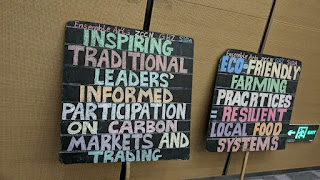ZAMBIA'S CLIMATE FINANCING UTILISATION LACKS TRANSPARENCY, ACCOUNTABILITY
...hence prone to corruption risks,posing threats against building climate change resilience, TIZ report reviews.

By Alfonso Kasongo
Zambia's quest to remain climate change resilient might veer off course, if gaps such as weak climate regulatory frameworks, corruption risks and lack of transparency in the management of climate financing remain unaddressed.
Ànd tackling of how the country supports mitigation and adaptation to climate change remain critical to building resilience to the worst effects.
Climate resilient is generally defined as successfully copying with and managing the impacts of climate change while preventing those impacts from growing worse.
This year's unprecedented global temperatures and stark devastating of climate change stress the urgency requirement for Zambia and many other countries to build climate resilience, hence the need for strong regulatory framework and transparency in the utilisation of climate financing.
With the external climate financing for Zambia standing at 95 percent of the total climate fund,Transparency International Zambia (TIZ ) has called for transparency in the administration of the funds if the country is to build strong climate change resilience.
But according to the Transparency International Zambia (2021 assessment report, with focus on carbon market and trading,Zambia's climate financing is filled with serious gaps in as far as it's sourcing and utililisation are concerned.
The report indicates lack of transparency and proper regulatory framework have triggered high corruption risks in the administration of the fund noting that Zambia's Nationally Determined Contribution (NDC) targets have costed climate change efforts to a tune approximately US$50 billion for the period of 2021 to 2030.
Presenting the findings to the house of chiefs, during the engagement meeting organized by the Zambia Climate Change Network, TIZ Programmes Assistant Sandie Sikazwe,says " lack of transparency in decision making processes of climate financing institutions in the country can trigger opportunities for corruption.Mrs. Sikazwe further explains ,"weak governance and oversight structures have contributed to insufficient checks and balances," that should ensure funds are being used for their intended purposes adding " corrupt actors maybe able to divert funds for their own benefits. "
The report also highlights that lack of accountability of climate funds may cause corrupt actors to feel emboldened to graft practices and that inadequate monitoring and evaluation make it difficult to track the usage of the climate finances,therefore, making it easier for corrupt elements to misappropriate the funds.
Mrs Sikazwe adds that "complex regulations, that is unclear and difficult regulations may be used by corrupt actors to take advantage of regulatory gaps.
Mrs Sikazwe also discloses that " the climate change fund is not in operational and revenue collected from carbon taxes are not designated for climate or environmental financing. "
Having highlighted the vulnerabilities Mrs Sikazwe observes that there is high risk of policy capture by the elite to ensure policies benefit them.
Other risks Mrs Sikazwe highlighted include among others, the risk that process of decision making on identifying climate mitigation projects like REDDS+ in the target areas are not transparent.
She adds" there is a risk that REDDS+ finding can be diverted and misappropriated.
The report ,therefore recommends for transparency and involvement of oversight institutions in the climate financing to ensure prudence use of the fund.
It also recommends for quick enactment of climate change bill and other strong regulatory frameworks.
Meanwhile Centre for Trade Policy and Development (CTPD) says there has been an increase to develop Climate Change regulations by many debt stricken countries to deal deal with debt indebtedness.
CTPD Climate Change Lead Researcher Solomon Mwampikita obaerves that carbon credit business in Zambia still face a challenge adding that there is no transparency and accountability.
Mr. Mwampikita further stresses the need to build strong regulatory framework for Climate Change related businesses to ensure accountability of the funds.
And House of Chiefs Chairperson Chief Chisunka has stressed the need for involvement of traditional leaders in issues of climate change including development of legal framework especially at the moment when carbon market and trading is taking centre stage in rural areas.
Chief Chisunka speaking during the ZCCN -House of Chiefs engagement meeting
The traditional leader observes "now we hàve seen carbon credit businesses and investors have gone into traditional areas."
" people outside our country are coming into our chiefdoms to look for places, we need Civil Society Organizations, Non Governmental Organizations and experts to help us .Working together with government, CSOs we can find means to calculate carbon credits,"Chief Chief Chisunka adds.





Comments